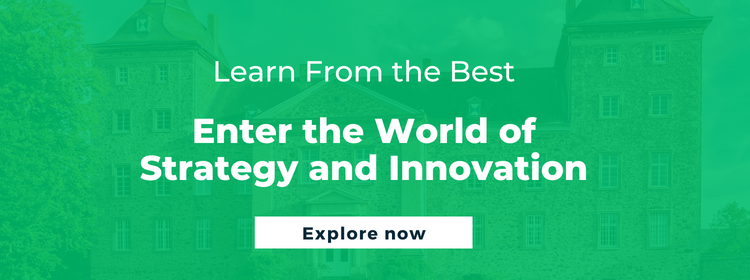What is Idea Generation? All You Need to Know for an Effective Strategy

- What is Idea Generation, and How Does it Differ From Brainstorming?
- How Can Businesses Encourage a Culture of Idea Generation Within Their Organization?
- What are the Benefits of Implementing Ideas Generated Through Idea Generation in Strategic Planning?
- How Can Idea Screening be Done?
- 5 Top Examples of Idea Generation
The path toward innovation starts with a first and essential phase: creating ideas. Idea generation is the basic method that allows businesses to discover new areas, solve intricate issues, and grasp new opportunities. Moreover, idea generation also underlines the strength of group thinking and imagination. It prepares the ground for significant progressions as well as tactical brilliance. Comprehending and utilizing the process of generating ideas is not only advantageous but a necessity for any group that wants to flourish in this rapidly changing environment. So, this guide explores deeply what idea generation means, why it is crucial for creating a solid strategy, and how to nurture it.
What is Idea Generation, and How Does it Differ From Brainstorming?
Idea generation is a methodical way of creating new and inventive ideas or solutions. It entails a wide variety of activities. Brainstorming concentrates on unimpeded thought without critique, while idea generation includes organized techniques that direct these thoughts toward actionable insights. This process comprises many steps, including ideas’ screening, where only the best ideas are selected. Comprehending the subtle differences between these two concepts is very important for any company committed to promoting an atmosphere of innovation.
How Can Businesses Encourage a Culture of Idea Generation Within Their Organization?

1. Promote an Open Environment
Creating a workspace where every voice is heard and valued is essential. An open culture encourages employees to share their thoughts without fear of judgment, thus fostering a fertile ground for idea generation.
2. Implement Structured Processes
Adopting a structured approach to the idea generation process can significantly enhance the quality of ideas produced. This includes establishing clear guidelines and stages, such as ideas’ screening, to manage the flow of ideas efficiently.
3. Encourage Diverse Thinking
Diversity in thought and perspective isn’t just about individual cognition. Rather, it’s a vital element in successful idea generation. By encouraging team members of various backgrounds to share their unique viewpoints, organizations can foster a more innovative and effective problem-solving environment.
4. Provide Tools and Resources
This includes access to creative spaces, technology, and information that can inspire and support their innovative efforts.
5. Recognize and Reward Contributions
Acknowledging and rewarding employees for their innovative ideas is crucial in maintaining a culture of engagement and motivation. Hence, this not only celebrates their contributions but also encourages ongoing participation in the idea generation process.
ALSO READ: What is Strategy? Choose the Best Approach for Business Growth
What are the Benefits of Implementing Ideas Generated Through Idea Generation in Strategic Planning?
1. Drives Innovation
Integrating ideas from the idea generation process into strategic planning is a powerful catalyst for innovation. This approach allows businesses to stay ahead of the curve by continually evolving and adapting to new challenges and opportunities.
2. Enhances Competitive Advantage
Leveraging unique insights and solutions allows companies to differentiate themselves in the marketplace.
3. Improves Problem-Solving
The inclusion of diverse ideas in strategic planning enhances problem-solving capabilities. Thus, with a wider range of perspectives, businesses can tackle challenges more effectively and efficiently.
4. Facilitates Growth
Strategic planning that incorporates the outcomes of idea generation fosters growth and expansion. By continually refreshing their strategies with new ideas, organizations can explore new markets, products, and services.
5. Boosts Employee Engagement
Involving employees in the strategic planning process through idea generation means that they will be invested in the company’s success. Hence, this not only enriches the strategy but also strengthens organizational culture.
ALSO READ: What is Strategic Planning? A Simple Guide
How Can Idea Screening be Done?
1. Establish Clear Criteria
Define a clear objective criteria for evaluating ideas in the idea screening process. Additionally, this ensures that the selection is based on merit and aligns with strategic goals.
2. Involve a Diverse Committee
Assemble a diverse group of individuals to participate in the idea screening process to get a well-rounded perspective on the ideas presented. This helps identify the most promising ones.
3. Utilize a Phased Approach
Employ a phased approach to idea screening for more thorough and deliberate evaluation. Consequently, ideas can be progressively refined and assessed for feasibility and impact.
4. Leverage Technology
Technology can significantly streamline the idea screening process. Tools such as Trello, MindMeister, IdeaScale, and Microsoft Teams are specifically designed to facilitate efficient organization and assessment of ideas.
5. Provide Feedback
Offer constructive feedback to those whose ideas were not selected. This encourages continued participation and demonstrates the value of each contribution, regardless of the outcome.
ALSO READ: Build a Robust Learning and Development Strategy
5 Top Examples of Idea Generation
 1. Crowdsourcing
1. Crowdsourcing
Crowdsourcing stands out as one of the more revolutionary idea generation examples. Organizations can tap into a wealth of knowledge and creativity by engaging a broad audience from various backgrounds and expertise levels. This process democratizes idea generation, allowing both internal stakeholders and the wider public to contribute their insights. Crowdsourcing platforms facilitate this interaction, making it easier to gather and evaluate suggestions from around the globe. Thus, the innovation potential is significantly amplified as diverse perspectives converge to solve problems and explore new possibilities.
2. Design Thinking
Design thinking emerges as a profound methodology within the realm of idea generation examples. This approach prioritizes empathy for the user, focusing on their needs, experiences, and challenges. By employing a series of iterative steps—empathize, define, ideate, prototype, and test—design thinking ensures that solutions are not just innovative but also deeply resonant with the intended audience. This human-centered approach fosters a culture of understanding and empathy, which is crucial for developing solutions that are both effective and meaningful.
3. Innovation Labs
Innovation labs represent physical or virtual spaces dedicated to the nurturing of creativity and experimentation. These labs are equipped with the latest technologies and resources, enabling teams to push the boundaries of what is possible. Within these collaborative environments, individuals are encouraged to explore, fail, learn, and iterate, embodying the true spirit of innovation. Thus, innovation labs serve not only as incubators for new ideas but also as beacons of inspiration, driving the idea generation process forward through a hands-on, experimental approach.
4. Hackathons
Hackathons have gained prominence as high-energy, collaborative events where creativity meets coding. These gatherings, often lasting for a few days, challenge participants to build new software solutions or improve existing ones within a constrained timeframe. The collaborative nature of hackathons fosters a unique environment where idea generation flourishes under the pressure of deadlines and the thrill of competition. Results often include groundbreaking prototypes and solutions, demonstrating the immense potential of such a concentrated, collaborative effort.
5. Employee Suggestion Schemes
Employee suggestion schemes represent a structured approach to capturing the innovative ideas of an organization’s workforce. By formalizing the submission and review of ideas, employees feel valued and heard, fostering a culture of ongoing innovation. These schemes often incorporate mechanisms for feedback and recognition, ensuring that contributors are motivated to share their insights continually. The implementation of successful ideas not only benefits the organization through improved processes, products, or services but also enhances employee engagement and satisfaction. This approach underscores the importance of leveraging internal talent for continuous improvement.
ALSO READ: Is Mapping Consumer Insights the Secret to Surviving in a Competitive Market?
The essence of idea generation lies in its power to unlock potential, drive innovation, and shape the future of strategic planning. Businesses that cultivate a robust culture of idea generation, supported by effective idea screening and a systematic idea generation process, position themselves at the forefront of their industries. Exploring Emeritus’ strategy and innovation courses can be a transformative step for those looking to enhance their strategic capabilities and foster a culture of innovation.
Write to us at content@emeritus.org






